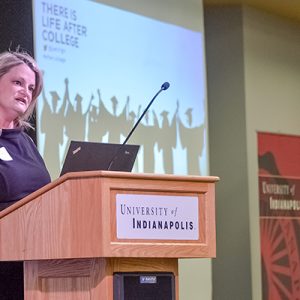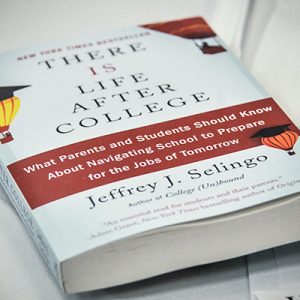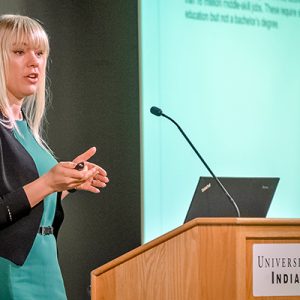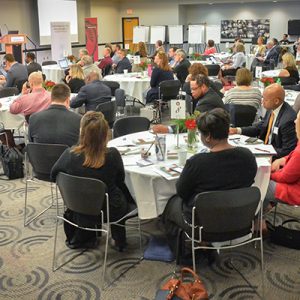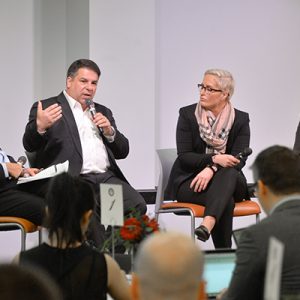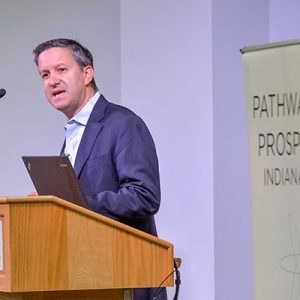Pathways to Prosperity explores new approaches to career success

Navigating the transition from education to a career has always posed challenges for graduates. With today’s employers focused on soft skills like collaboration and problem-solving, the demands of the modern workforce require new solutions.
The University of Indianapolis recently hosted an event, Pathways to Prosperity: Rethinking the Transition from Education to Career, to explore the new approach universities are taking to prepare students for successful careers.

The event was co-hosted by the University of Indianapolis, Strada Education Network (formerly USA Funds) and author Jeffrey J. Selingo. A group of local, state and regional education leaders, business executives and policymakers joined the collaborative workshop to explore how schools and universities can better equip students to succeed.
Selingo, author of “There is Life After College” and “College (Un)bound,” compared the skills his young children learned in preschool to the modern workplace – and argued they’re more relevant today than ever. Curiosity, sharing and negotiating – all important in the preschool and kindergarten world – also are key to career success. But instead of focusing on those skills, Selingo said higher education is “like the workplace of old – very rigid, very task-based. A syllabus tells you what you need to do and when you need to do it.”
In contrast, Selingo said today’s workplace tends to be less structured. While the need for hard skills and a strong liberal arts background–like that offered at UIndy–is still very much sought after, companies need graduates who “have the soft skills to navigate the ambiguity in the workplace.”
The University of Indianapolis addresses that need for soft skills and real-life learning through its partnership with the Strada Education Network on the coLAB (formerly known as the Professional Edge Fellowship Program). CoLAB is designed to match full-time students with real paying jobs related to their field of study, and allows students to develop crucial skills like problem-solving, collaboration, leadership, communication and conflict resolution. It’s those soft skills that Selingo said make graduates good employees capable of helping businesses prosper.
“CoLAB has significantly assisted in our efforts to engage central Indiana employers and provide opportunities for our students,” said Corey Wilson, associate vice president of the Professional Edge Center. “The Professional Edge Center is excited about the broadening conversation relative the increasing talent pipeline for employers. To ensure that our students are ready for these opportunities, our office stresses the importance of the development of high-demand soft skills that will give students the one point advantage they need when they are being interviewed for a position.”
In addition to programs like coLAB, internships are an ideal way to develop time management and other valuable soft skills, Selingo said. The most successful graduates he found in his study of millennials were those who had done an internship during their academic career.
“Large organizations hire directly from their intern pool. They don’t trust that new graduates have the soft skills,” Selingo said.
Time management is another skill that today’s graduates may need to practice before entering the workforce. Selingo gave an example of Xerox, which took a survey of new employees and found that their number one learning goal was time management. “It was the first time in their lives they were asked to manage their own time and they didn’t necessarily know how to do it,” Selingo said.
Selingo argued that the educational system should allow students more time to explore their passions, which he hopes will lead to more fulfilling careers.
“Students need to leave college with more than just those pieces of paper,” he said.
Written by Sara Galer, Senior Communications Specialist, University of Indianapolis. Contact newsdesk@UIndy.edu with your campus news.

